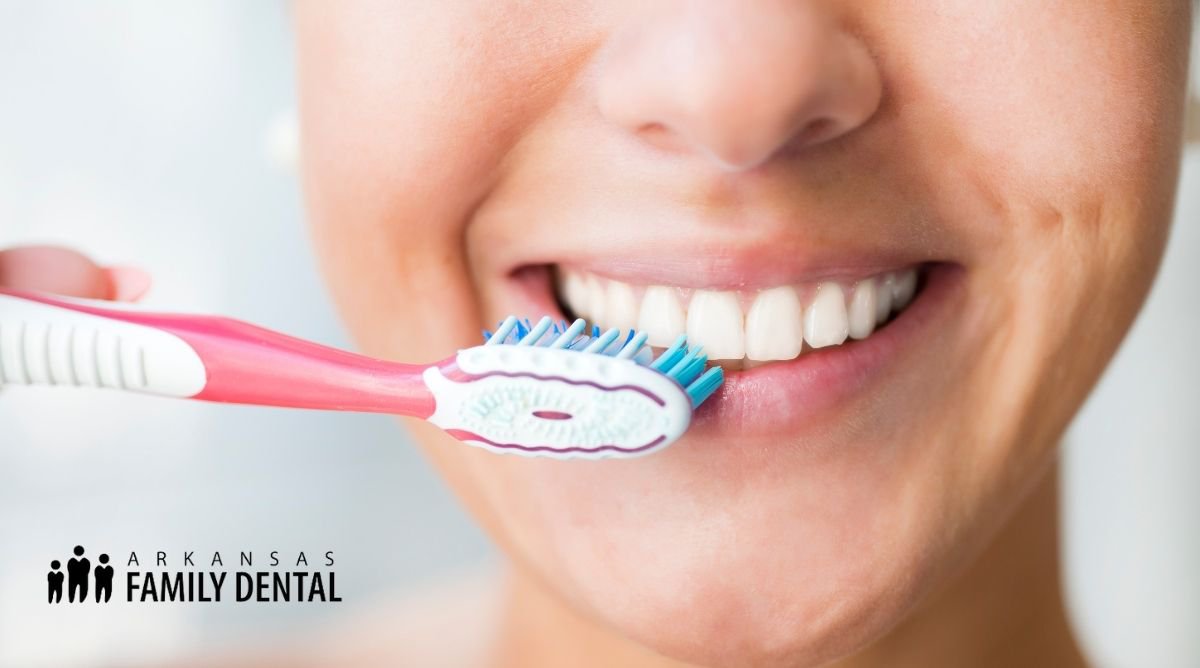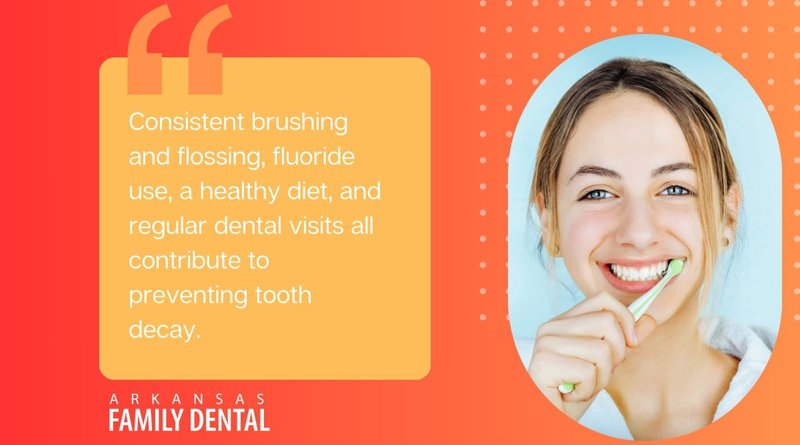Preventing Tooth Decay: What Steps Actually Work?

April 29, 2025
Tooth decay is more than just cavities—it’s a serious threat to oral health. With so much advice out there, what actually helps? Preventing tooth decay comes down to consistent habits and smart choices. From daily brushing to dietary changes, let’s explore the most effective steps. If you want strong, healthy teeth for life, read on—you might be surprised by what makes the biggest difference!
Key Takeaways:
- Cause of Tooth Decay: Bacteria turn food into acid, eroding enamel and leading to cavities.
- Bacterial Role: Streptococcus mutans feeds on sugar, produces acid, and forms plaque, which accelerates decay.
- Sugar and Cavities: Sugar fuels bacteria, causing repeated acid attacks that weaken enamel.
- Plaque’s Impact: A sticky bacterial film that, if not removed, turns into tartar and leads to decay and gum disease.
- Daily Prevention: Brush twice daily with fluoride toothpaste, floss once a day, and limit sugary foods.
- Fluoride’s Role: Strengthens enamel, slows erosion, and lowers cavity risk; professional treatments help high-risk individuals.
- Diet and Cavity Risk: Avoid sugary, acidic foods; eat dairy and crunchy vegetables for stronger enamel.
- Natural Remedies: Oil-pulling, baking soda, and mineral-rich foods can support enamel but don’t replace professional care.
- Dental Care Importance: Regular checkups, cleanings, fluoride treatments, and sealants prevent cavities and larger dental issues.

Causes of Tooth Decay
Tooth decay occurs when bacteria in your mouth turn food into acid. This acid eats away at tooth enamel, creating cavities. If untreated, decay can spread deeper, causing pain or infection.
Bacteria
Bacteria in the mouth feed on sugar and starch from food. As they digest these, they produce acid, which weakens enamel and leads to cavities. Streptococcus mutans is one of the main bacteria responsible, forming plaque that sticks to teeth.
Sugar Consumption
Sugar helps bacteria produce acid that damages teeth. Sticky and processed foods, such as candy and soda, make the problem worse. Every time sugar is consumed, an acid attack on enamel lasts for about 20 minutes. The more often sugary food is eaten, the greater the risk of decay.
Plaque
Plaque is a sticky film of bacteria that adheres to teeth. If not removed, it traps bacteria and acid against enamel, accelerating decay. Over time, it hardens into tartar, which is much harder to remove and can contribute to gum disease.
Brushing and flossing remove plaque before it causes harm. Fluoride strengthens enamel, making it more resistant to acid attacks. Cutting back on sugary and starchy foods slows plaque buildup and reduces the risk of decay. For more ways to prevent tooth decay, follow a strong daily oral care routine.
The Best Daily Oral Hygiene Practices for Preventing Tooth Decay
Brushing and flossing every day are key to avoiding cavities. Brush at least twice daily with fluoride toothpaste for two minutes each time, making sure to clean all tooth surfaces, including along the gumline.
Use a soft-bristled toothbrush and hold it at a 45-degree angle. Move it in gentle, circular motions to remove plaque without irritating gums. Replace your toothbrush every three months for the best results.
Flossing once a day removes plaque and food that a toothbrush can’t reach. Wrap the floss in a C-shape around each tooth and move it gently along the sides. If flossing is difficult, try interdental cleaners like an Oral-B Interdental Brush or Sulcabrush.
Electric toothbrushes may be more effective than manual ones for some people. They can remove plaque more efficiently and may be easier to use, though a manual brush is effective when used correctly.
Hydrogen fluoride mouthwash can help strengthen enamel and reduce cavity risk, especially for people prone to decay. Some mouthwashes also fight bacteria that cause plaque buildup.
Eating less sugar and starchy snacks helps prevent cavities. Sticky foods like candy, chips, and pretzels are especially harmful. When eating them, brushing them soon afterward can reduce damage.
Drinking fluoridated water is another easy way to protect teeth. Aiming for at least a pint of fluoridated water daily can strengthen enamel and reduce cavities.
For a complete checklist of daily dental hygiene tips, visit this guide.
How Fluoride Helps in Preventing Tooth Decay
Fluoride protects teeth by strengthening enamel. It helps replace minerals lost due to acids from bacteria and food. Brushing with fluoride toothpaste allows enamel to absorb fluoride, making teeth more resistant to decay.
The Benefits of Fluoride Toothpaste
Fluoride toothpaste slows enamel erosion, reduces plaque buildup, and lowers cavity risk. It also fights bacteria that lead to decay while reinforcing tooth structure. To get the full benefits, brush twice a day and spit out extra toothpaste without rinsing, allowing fluoride to stay on teeth longer.
Seeking Professional Fluoride Treatments
Professional fluoride treatments are helpful for those at greater risk of cavities. Dentists apply fluoride as a varnish, gel, or foam to strengthen teeth. Children, people with dry mouth, or those with frequent cavities may benefit most. These treatments can slow or stop early decay before it worsens.
For more information on fluoride, visit the CDC’s fluoride guide.
How Diet Impacts the Risk of Developing Cavities
Food choices significantly affect dental health. Sugary foods and drinks provide bacteria with fuel to create acid, wearing down enamel.
Dairy products like cheese and yogurt help protect teeth by providing calcium and phosphates, which strengthen enamel. These foods also promote saliva production, helping wash away harmful acids.
Acidic foods, such as citrus fruits and soda, weaken enamel over time. When enamel erodes, teeth become more sensitive and more likely to develop cavities. Drinking water after consuming acidic foods helps neutralize acids.
Sugary drinks, including soda, sports drinks, and fruit juices, increase the chance of decay. The sugar lingers on teeth, feeding bacteria. Water remains the best drink for dental health since it rinses away food and keeps the mouth hydrated.
Crunchy vegetables such as carrots and celery help clean teeth while chewing. They remove food particles and plaque, promoting better oral hygiene. A balanced diet that includes proteins, whole grains, and fresh vegetables supports strong teeth.
Diet alone won’t prevent cavities, but making smart food choices reduces risk. Pair good nutrition with proper oral care for better protection.
Natural Ways to Strengthen and Remineralize Teeth
Certain habits can naturally help enamel stay strong and are helpful for preventing tooth decay. The enamel on teeth loses minerals daily from acidic foods and bacteria. Saliva restores some minerals, but when the damage exceeds the repair process, cavities develop. Fluoride remains the most effective way to strengthen enamel, though some natural methods may offer support.
Oil pulling with coconut or sesame oil may reduce harmful bacteria. This involves swishing oil around the mouth for about 15 minutes before spitting it out. While it does not rebuild enamel, it may promote healthier gums and reduce bacteria that contribute to decay.
Baking soda helps regulate mouth pH, lowering acid levels that weaken enamel. It has mild abrasive properties, which can help clean teeth without causing damage. Some studies suggest baking soda for teeth may assist with plaque removal, though it does not restore enamel.
A diet high in calcium, phosphorus, and vitamin D helps maintain strong enamel. Dairy products, leafy greens, nuts, and fish provide necessary minerals. Cutting back on sugary and acidic foods further supports enamel health.
While home remedies contribute to oral health, they do not replace professional care. If enamel shows signs of wear or cavities form, scheduling a dental visit is the best step.
How Professional Dental Care Helps Prevent Tooth Decay
Regular dental checkups catch early signs of tooth decay before problems worsen. Dentists check for cavities, remove plaque, and assess gum health. Treating small issues early prevents the need for more complex procedures.
Professional cleanings remove tartar that brushing and flossing cannot. Tartar buildup leads to gum disease and decay. Hygienists use specialized tools to clean teeth and polish them, making it harder for plaque to accumulate.
Applying dental sealants to molars protects them from bacteria and food particles. Sealants reduce cavity risk, especially for children, though adults can benefit as well.
Consistent brushing and flossing, fluoride use, a healthy diet, and regular dental visits all contribute to preventing tooth decay. Cavities are easier to avoid than to treat, making daily oral care essential for long-term dental health.
How to Prevent Tooth Decay and Keep Your Smile Strong
Tooth decay is one of the most common dental issues, but it’s also highly preventable. Brushing with fluoride toothpaste, flossing daily, and limiting sugary foods can help protect your teeth from cavities. Regular dental checkups allow your dentist to catch early signs of decay before they become serious problems. Arkansas Family Dental is here to support your oral health journey. Schedule an appointment today to keep your teeth strong and cavity-free!
Connect With
Call (501) 232-6273 or request an appointment online to set up your first visit. We’ll be in touch soon.
